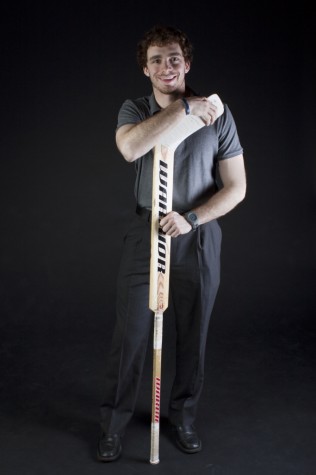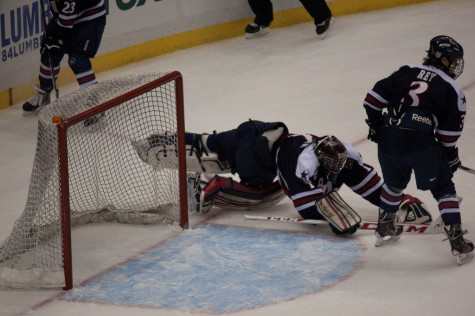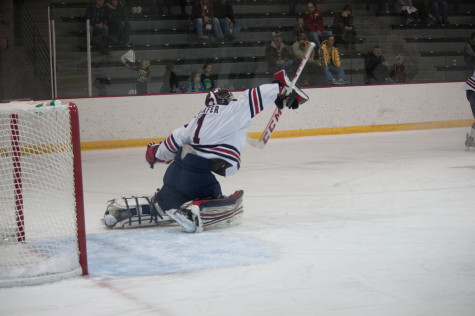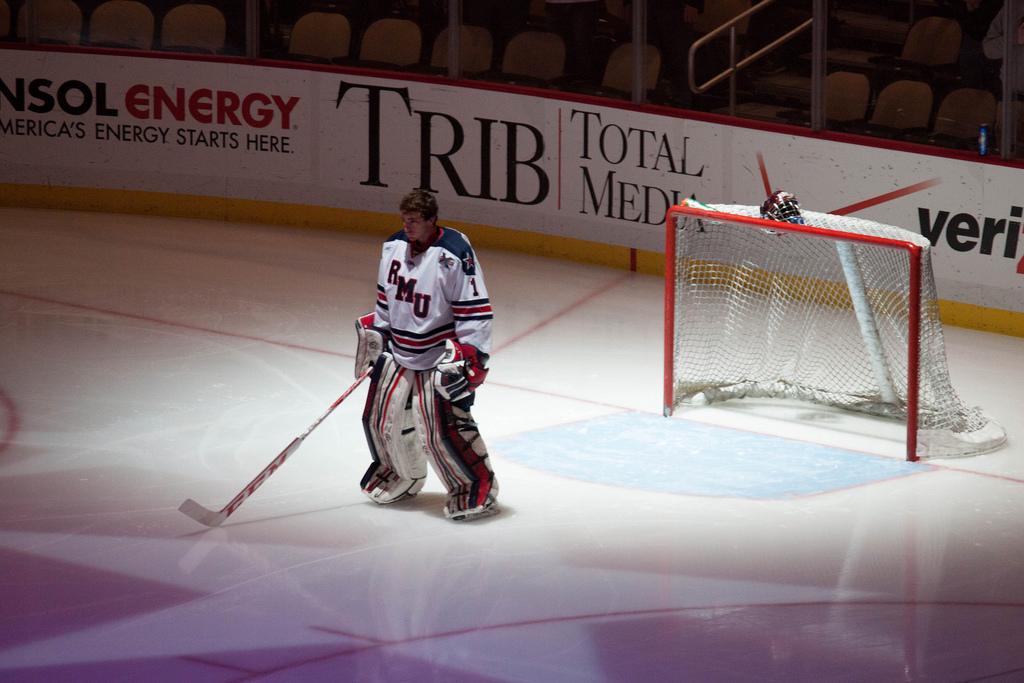Still a Dreamer
Terry Shafer makes the most of 2013-2014 season
April 28, 2014
 “Some of my teammates can’t handle how exciting I am so they had to try to make something to make me seem more calm and vanilla,” says Terry Shafer, goaltender for the RMU men’s ice hockey team.
“Some of my teammates can’t handle how exciting I am so they had to try to make something to make me seem more calm and vanilla,” says Terry Shafer, goaltender for the RMU men’s ice hockey team.
Shafer is referring to the Twitter account created by teammate Colin South. @VanillaTerry1 cleverly and satirically documents all of the sophomore’s basic endeavors.
“It was just kind of a funny little thing that Colin needs for a self-esteem boost,” he wryly adds.
Jokes aside, this netminder is anything but “#basic.”
Like any other athlete, the passion for the sport came at an early age, around five years old. The youngest boy in the family, with a cousin and brother already hockey-crazed, Shafer didn’t seem to have a choice.
“I kind of got pushed into it more than anything,” he says. “Out in the road, they’d need a goalie, so they’d tape pillows to my legs, give me a baseball glove for one hand, and one of their hockey helmets and told me to stand in front of the garage.”
Shafer’s driveway hockey career had its share of accidents, however.
“When he was five or six, on Christmas Eve he and his older brother and nephew were playing knee hockey in the basement and just when dinner was ready, he got his two front teeth knocked out by his older brother,” says Bill Shafer, father of Shafer. “The significant thing is not that, but the next morning, he still showed up and sang in the children’s choir without two front teeth.”
Thus, hockey continued.
Shafer had an opportunity to be in net for the local youth league, and everything fell into place. So he decided to stick with the position.
His career progressed to junior hockey, where he was in net for the Rochester Stars, the Atlanta Junior Knights, and most recently, the New Hampshire Junior Monarchs. With the program, Shafer had the opportunity to hone his skills by facing countless Division I hockey commits and help his team to an EJHL championship title.
In New Hampshire, the goalie was coached by Sean Tremblay, a man with six EJHL Dineen Cups and the title of “one of the fifty most influential people in hockey in New England,” to his name.
“He’s a kid that has good size, which is something as coaches we can’t teach. He was a kid that we went after,” says Tremblay. “We were having a little bit of goaltending problems…and we wanted to bring someone in to kind of challenge the guys that were there and also someone that could come in and kind of settle the team down and Terry did just that.”
Shafer was billeted with his coach during his time with the Junior Monarchs.
“Talk about having to live the right way day in, day out,” chuckles Tremblay. “There’s nowhere to hide in that environment.”
Somehow, Shafer managed to keep a few secrets.
“He hid some cookies in my stepson’s drawer upstairs which we found after he left. He blamed it on our stepson,” recalls the coach. “I was like ‘hey, I thought you were on a diet.’ He goes, ‘those aren’t mine.’ I don’t think he even knows that to this day.”
At the end of his junior hockey career, Shafer was to attend the Eastern College Athletic Conference’s, until the plan was dashed due to financial matters. One phone call from RMU associate head coach and Colgate alum, Matt Nicholson, and one recruiting process later, Shafer was calling himself a Colonial.
“Once I got the offer from Robert Morris there was no doubt in my mind that this is where I wanted to be,” he explains. “I was happy when I came to visit here I liked all the guys I met, the staff was great, it just felt right. Felt like a perfect fit for me.”
And what a fit it was, and still is.
Last season, he was back-up to one of RMU hockey’s most notable alumni, Eric Levine. Shafer entered the 2013-14 season with only 194 minutes to his name.
“The first year I think he had some confidence but he wasn’t 100 percent prepared to play at division one level. When I say prepared to play, I don’t think his mindset was right,” says head coach Derek Schooley.
“I don’t know if he worked as hard as he possibly could as a backup. I’m not saying he didn’t work hard, but he could’ve worked a little bit harder to prepare himself for an opportunity,” he continues.
But the offseason can change a lot.
“Over the summer, he came back in great shape, he came back confident, he came back ready to assume the position of starting goaltender,” notes Schooley.
This type of transformation is a process that seems to have followed Shafer throughout his career. It’s occurred not only at Robert Morris, but with the Junior Monarchs as well.
“I think the biggest thing with Terry is I think he learned how to work a little bit harder every single day to bring a better consistent effort to the rink,” says Tremblay. “I think there was definitely something that was missing a little bit previously, he relied on his athleticism.”
“Probably my biggest change is just that I’m a lot more confident, whether it’s in practice or games or just talking guys up, letting people know I’m there,” notes Shafer. “When you only play three or four games, you can kind of slug through a few practices if you need to, but this year, you want to have a good week of practice every weekend, heading in knowing that you’re going to play two games.”
In the first half of the season, Shafer started the bulk of the games for the Colonials, but it was never a surprise to see up-and-coming freshman netminder Dalton Izyk, who was injured earlier in the season, between the pipes.

“I challenged terry at Christmas to come back and be ready to attempt to assume the starting job,” says Schooley. “I said I’m going to give you the first few games here, go out and take it. And he did that at the Three Rivers Classic. And for the most part…he didn’t give up the net.”
With the change in calendar year, there was a change in the team, goaltending included. Each player was beginning to find his place in the grand scheme of the team and the wins began to flow in. Yes, it seemed as though RMU hockey had everything figured out.
Until March 9.
The Colonials were well into playoff mode, taking on Army. The game began like any other. Shafer completed the usual pregame ritual of putting on every part of his gear left then right, and gave defenseman John Rey a good punch to the stomach.
But soon, the momentum that the team had worked so hard to perfect would be in jeopardy. On a penalty kill two minutes into the second period, Shafer’s season would be changed for good.
Moving out of position on an attempt to retrieve a puck, the goaltender’s hip was injured.
“It was such a weird play when I got hurt. I guess I knew I was hurt right away, but I kind of thought, okay maybe I just twisted my knee, maybe I tweaked it, so I tried to stay in and just kind of shake it off,” Shafer recollects.
“They came down on a two on one shortly after they scored that when I got hurt and I tried to go on a butterfly and I couldn’t drop one of my knees down all the way and that’s when I knew something was wrong.”
Defenseman Chase Golightly helped the slumped-over Shafer to the bench for further examination by a trainer, who decided the goalie wasn’t fit to continue playing.
“I knew that something was wrong and this was probably the end of my season,” Shafer reflects.
“Honestly, I went back and I started crying in the locker room thinking to myself, this is the end of my season, this might be the end of our team season, and such a rush of emotions,” he continues, after a long pause.
“After a minute or two of going to the locker room and being so upset, you kind of snap out of it and say, wait a second, it’s one nothing, this isn’t the end of the world, I’m a part of this team, we have to win this game, and thankfully we did come back and won that game.”
The team was in good hands after the change in net. Izyk assumed the position of starting goaltender and handled it better than most true freshmen would. At the conclusion of the season, Izyk earned a .917 save percentage in the 11 games he played and went on to be named RMU hockey’s Rookie of the Year.
The transition was flawless, thanks in part to the camaraderie between Shafer and Izyk.
“He was very, very supportive of Dalton,” says Schooley. “He was one of the first guys, when we realized Terry was going to be out for the year, he said ‘Dalton can get the job done.’”
Shafer did his part in mentoring Izyk, but wasn’t overbearing. Here and there, he’d toss out observations past and present about teams and rinks.
“He’s been really helpful with getting me prepared and comes up to me in between and gives me hints like, maybe try this or look at this differently,” explains Izyk. “And we do video together so definitely a closer bond over the past year.”
Being sidelined for any activity, athletic or not, can be a trial; especially when much of the leg work has been done by the very athlete that is watching from the stands.
“It was tough, and it was a hard time for me right off the bat kind of just to accept that I’m done from the season,” says Shafer. “But everybody on the team came to me throughout the playoff run all the way to the end of Minnesota and whether somebody came to me once or guys came to me as much as eight, nine times, and said ‘hey, we wouldn’t be here without you. You did a great job this season.’”
“[The injury is] the same thing I had last year, so I definitely knew how he felt then to play most of the season and the last part not being [able to play],” echoes Izyk. “It’s definitely hard to give it 110 percent when your body’s torn apart, so I definitely told him don’t worry. Get back fast. I was fine, so you’ll definitely be back fast…you’ll be okay.”

With a timetable of late August, there’s a good chance Shafer can pick up where he left off, though Schooley doesn’t want to push him if he’s not ready.
“We’ve got two very capable goaltenders returning,” says Schooley. “They both have earned the opportunity to play next year. Terry being a third-team all-league player and Dalton with what he did after Terry went down. I love our situation in net the next few years, that’s for sure.”
“It’s about how hard you push it and want to get back, but he’s definitely really motivated so I think he’ll be back very soon,” notes Izyk. “Sooner than expected.”
The Atlantic Hockey Association’s all-conference third team goalie’s summer will be filled with rehabilitation for his hip, maintaining swift reactions so that he can match this past season’s .911 save percentage, and putting in time at his family’s tissue paper mill, a pretty basic, tedious job.
“It makes you look forward to coming back to school,” Shafer laughs.
A silent motivator to keep striving greets the netminder every single day. Etched into Shafer’s left arm is the word “Dream.”
“A very close person to me passed away and they were always encouraging me to follow my dreams and do what I want to do. They told me, ‘You’ve got a dream. You’ve got to go after it.’ It’s a reminder, don’t waste any day. Just get out, go and chase your dream. Some people can’t do it. I’m very fortunate that I can. So I try not to waste every day and use it as motivation to get up and get out and work for my dream, which is to play at the highest level I can,” says Shafer.
In late summer, Shafer will return for his third season as a Colonial, ready to push himself to whatever limits to work back up to this past season’s level. Still proving himself non-vanilla, and still a dreamer.
